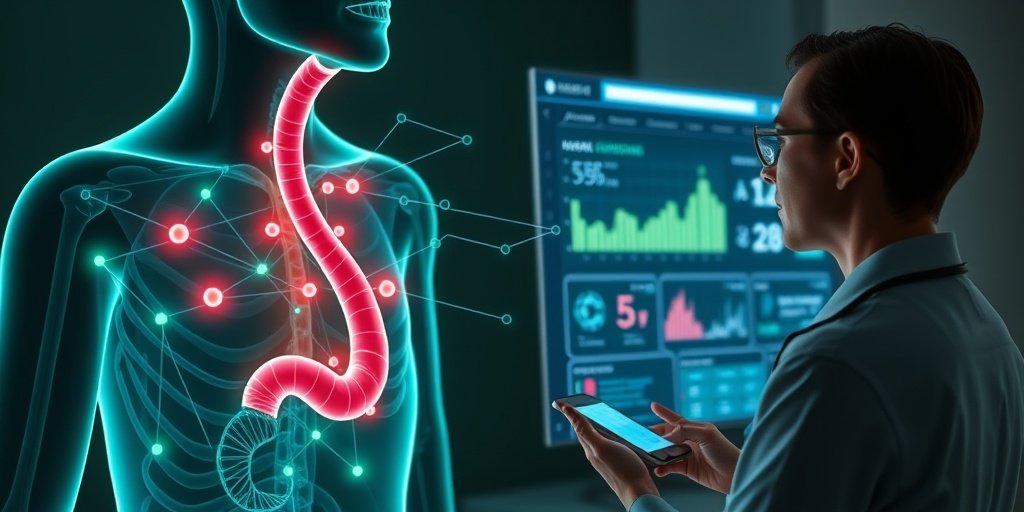⚡ Quick Summary
This study developed a personalized risk prediction model for esophageal cancer (EC) by integrating genetic data and virtually generated alcohol consumption data. The findings suggest that individuals with specific genetic markers could reduce their risk of EC by up to 50% through abstaining from alcohol.
🔍 Key Details
- 📊 Dataset: 86,845 individuals, including 763 diagnosed EC patients
- 🧬 Genetic markers: rs671 and rs1229984
- ⚙️ Technology: Eight machine learning models including Ensemble and Random Forest
- 🏆 Performance: Ensemble model achieved an AUC of 0.9577 and sensitivity of 0.9211
🔑 Key Takeaways
- 🧬 Genetic predispositions play a crucial role in EC risk assessment.
- 🍷 Alcohol consumption is a significant lifestyle factor influencing EC risk.
- 💡 Virtual data generation allows for innovative risk evaluation scenarios.
- 📉 Abstaining from alcohol can significantly lower risk for high-risk individuals.
- 🏆 Ensemble model outperformed other models in predicting EC risk.
- 🌍 Study conducted using data from the Taiwan Biobank.
- 🔍 Personalized medicine is becoming increasingly important in cancer risk assessment.

📚 Background
Esophageal cancer (EC) is a major public health concern, particularly in areas with high alcohol consumption. The disease’s etiology is complex, involving both genetic factors and lifestyle choices. Understanding these factors is essential for developing effective prevention strategies and personalized risk assessments.
🗒️ Study
This study aimed to create a personalized risk prediction model for EC by integrating genetic polymorphisms with virtually generated alcohol consumption data. Researchers analyzed a large dataset from the Taiwan Biobank, employing advanced machine learning techniques to evaluate risk profiles under various consumption scenarios.
📈 Results
The analysis indicated that individuals with the genotypes rs671 = AG and rs1229984 = CC had the highest probabilities of developing EC, with risk values ranging from 0.2041 to 0.9181. Notably, abstaining from alcohol could reduce their risk by approximately 16.29-49.58%. The Ensemble model’s performance was particularly impressive, achieving an AUC of 0.9577 and a sensitivity of 0.9211.
🌍 Impact and Implications
The findings from this study underscore the importance of integrating virtually generated alcohol data into personalized risk assessments for EC. By identifying high-risk individuals and promoting lifestyle changes, such as alcohol abstinence, we can potentially reduce the incidence of this challenging disease. This research paves the way for more tailored approaches in cancer prevention and management.
🔮 Conclusion
This study highlights the transformative potential of combining genetic data with innovative data generation techniques in predicting esophageal cancer risk. By focusing on personalized assessments, healthcare professionals can offer more effective prevention strategies, ultimately improving patient outcomes. Continued research in this area is essential for advancing our understanding of cancer risk factors and enhancing public health initiatives.
💬 Your comments
What are your thoughts on the integration of genetic data and lifestyle factors in cancer risk assessment? We would love to hear your insights! 💬 Leave your comments below or connect with us on social media:
Personalized prediction of esophageal cancer risk based on virtually generated alcohol data.
Abstract
BACKGROUND: Esophageal cancer (EC) presents a significant public health challenge globally, particularly in regions with high alcohol consumption. Its etiology is multifactorial, involving both genetic predispositions and lifestyle factors.
METHODS: This study aimed to develop a personalized risk prediction model for EC by integrating genetic polymorphisms (rs671 and rs1229984) with virtually generated alcohol consumption data, utilizing advanced artificial intelligence and machine learning techniques. We analyzed data from 86,845 individuals, including 763 diagnosed EC patients, sourced from the Taiwan Biobank. Eight machine learning models were employed: Bayesian Network, Decision Tree, Ensemble, Gradient Boosting, Logistic Regression, LASSO, Random Forest, and Support Vector Machines (SVM). A unique aspect of our approach was the virtual generation of alcohol consumption data, allowing us to evaluate risk profiles under both consuming and non-consuming scenarios.
RESULTS: Our analysis revealed that individuals with the genotypes rs671 = AG and rs1229984 = CC exhibited the highest probabilities of developing EC, with values ranging from 0.2041 to 0.9181. Notably, abstaining from alcohol could decrease their risk by approximately 16.29-49.58%. The Ensemble model demonstrated exceptional performance, achieving an area under the curve (AUC) of 0.9577 and a sensitivity of 0.9211. This transition from consumption to abstinence indicated a potential risk reduction of nearly 50% for individuals with high-risk genotypes.
CONCLUSION: Overall, our findings highlight the importance of integrating virtually generated alcohol data for more precise personalized risk assessments for EC.
Author: [‘Nfor ON’, ‘Huang PM’, ‘Wu MF’, ‘Chen KC’, ‘Chou YH’, ‘Lin MW’, ‘Zhong JH’, ‘Kuo SW’, ‘Lee YK’, ‘Hsu CH’, ‘Lee JM’, ‘Liaw YP’]
Journal: J Transl Med
Citation: Nfor ON, et al. Personalized prediction of esophageal cancer risk based on virtually generated alcohol data. Personalized prediction of esophageal cancer risk based on virtually generated alcohol data. 2025; 23:379. doi: 10.1186/s12967-025-06383-9